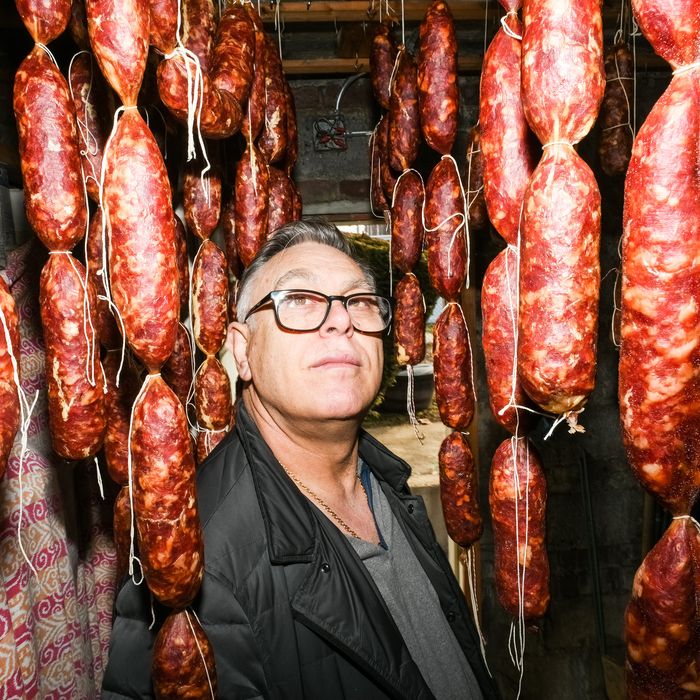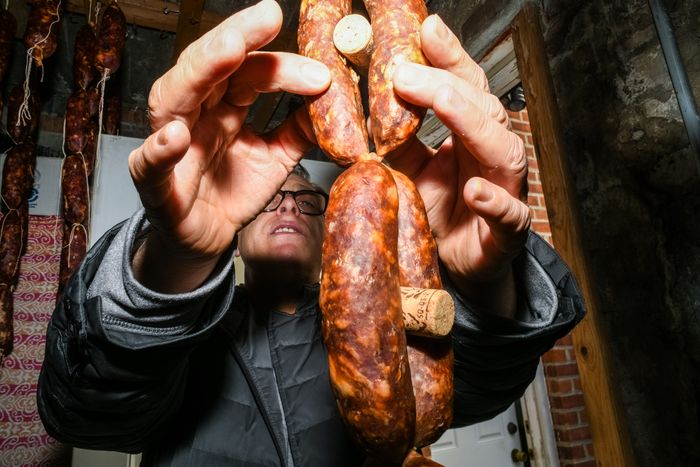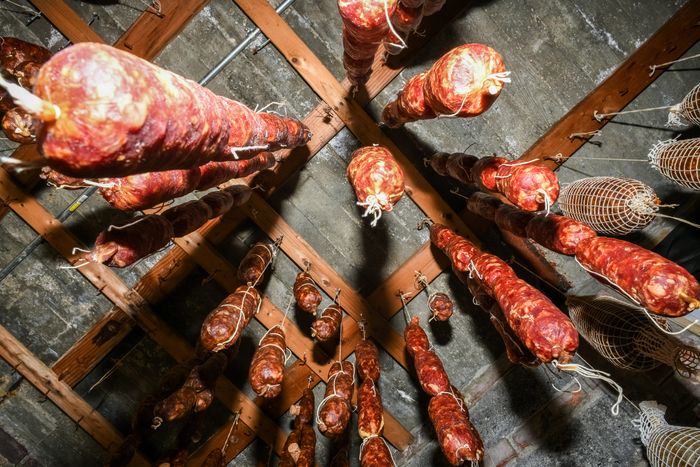
Food nerds love to wax on about the romance of the artisan, that (often imagined) person who is singularly devoted to the craft of cooking, of creating something with their hands, always prioritizing deliciousness over profits. These are the people training their dogs to sniff out truffles in the woods of Alba, the Thai street merchants who have made (and perfected) one dish their entire lives, the barbecue savants who can direct and manipulate smoke the way a painter handles strokes of a brush. Or, in the case of this story, it’s a barber who’s been working at Astor Place Hairstylists for 40 years named Dominic Pellegrino, and who just so happens to make the best salami you (and I) can’t buy.
Pellegrino’s curing room is at his home in Allerton, far up in the Bronx if not the end of the line. This year, about 230 links of soppressata are strung up in his cellar to age until they’re ready. He grew up on the coast in Calabria, at the southern tip of Italy, and says this is the time of year back home when they’d be using local pigs to make any variety of cured meats, many of which he can’t make in the city, especially anything that requires a fire. “But with the salami,” Pellegrino says, “nobody calls the fireman.”
Frank Ribecca, the manager at the barbershop, tells me he wasn’t surprised when he learned about Pellegrino’s hobby. “We’re paisans. He’s from the town over in Italy from where my parents come from,” he says. “My grandparents, also, would have their garden, make their own soppressata, gabagool, the sausage, prosciutto — Dom’s got that touch for it.”
This year, Pellegrino ground 200 pounds of meat and stuffed it into the casing he gets at Calabria Pork Store on Arthur Avenue. For all of that commitment, and it’s a lot, he has no intention of selling any of it. He hands out the finished sausage to friends, like his son’s father-in-law (“he eats it in two minutes”), and in-the-know clients from Astor Place, such as the restaurateur Drew Nieporent, who looks forward to the soppressata every year. Nieporent occasionally even shares it himself, like the time he brought some to his chef at Tribeca Grill: “I said, ‘Taste this. What do you think?’” The chef was thrilled. Could they get some? Alas, no. “I was like, ‘It’s from my barber.’ He got a kick out of that.”
Some friends, like Astor Place’s owner, Jonathan Trichter, have tried to convince Pellegrino to sell at least some of this product. “I would absolutely back him,” Trichter says, “but I don’t think he’d be interested.”
He’s not. Instead, Pellegrino says he makes the salami because “that’s what we used to do — you connect to your roots.” Walking into his cellar, he says, reminds him of his home. “When you’re in the room, it’s like, Oh, man, that feels so beautiful.” On the day I visit, I notice the pro-size butcher-block table and the vacuum-sealed four-pack of soppressata. Pellegrino is mostly concerned with locating his corkscrew, joking that his wife, Minerva, has moved it somewhere. “He don’t want me in here,” she says, laughing. Soon enough, though, the corkscrew is found, the wine is poured, and Pellegrino grabs some salami, pointing to the grinds of pepper within.
The smell in the room does transport you. There is pork and spice and some smoke. Close your eyes and you could be in a curing room in pastoral Italy — at least until a car blaring Bad Bunny drives by and you remember you’re in the Bronx. And thank God you’re in the Bronx, where great food is everywhere: maafe prepared by a neighbor, originally from Mali, who lives around the corner; pastelillos made with sand crabs caught in Puerto Rico.
“Eat. Eat,” Pellegrino encourages. “It’s good stuff, man.” The meat is softer and less oily than the soppressata you’ll find at stores. It’s sweet with a faint hit of chile. I take another bite and think back to the way Nieporent described it to me: “It has its own personality, but it always tastes the same.”
Soon, Pellegrino pulls out a mason jar packed with salted green tomatoes, seasoned with oregano, parsley, garlic, and olive oil. He instructs me to take a bite — these would absolutely kill it on any Italian combo — and to swipe some bread through the oil. “You kiss the bread,” he says. “You can’t throw it out.”
We finish our wine, and Pellegrino reaches for a crumbled Poland Spring bottle filled with grappa that a friend brought back from Albania. I’ve tapped out on the charcuterie but know that I’ll be thinking about it for days, already hoping I’m one of the lucky few to try next year’s supply. When I ask Pellegrino if he’s changed his methods over the decades, or if his soppressata has improved, it doesn’t really register. “What?” he asks back. “Salami making,” he says, “you cannot really change.”







